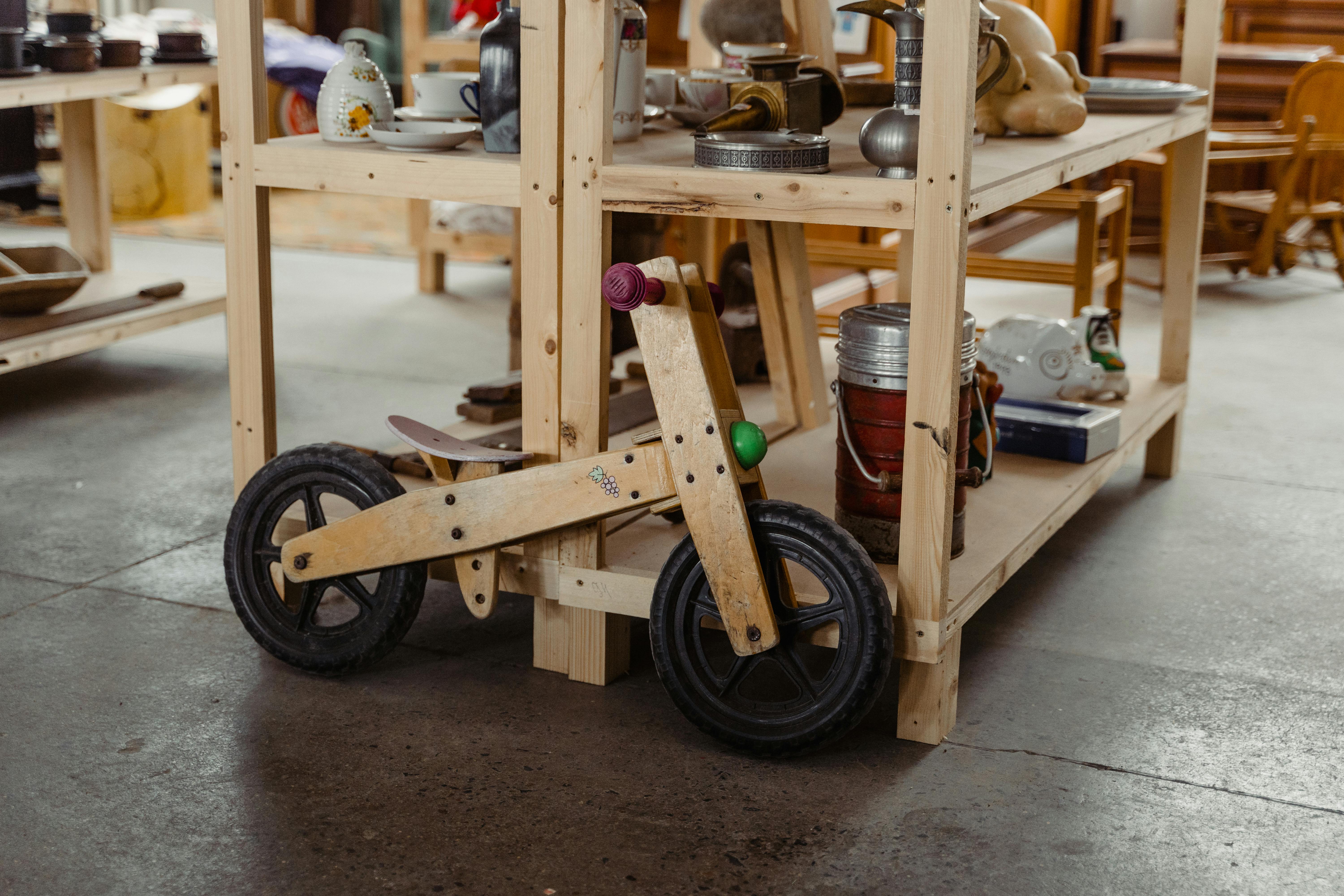Alright, listen up. If you're a reseller, you know the drill: hit up the thrift stores, maybe scout a yard sale or two on a Saturday morning. And sure, sometimes you strike gold. You find that vintage band tee, a pristine Pyrex dish, or a piece of furniture that just needs a little TLC. But honestly? Those spots are getting picked over faster than a free pizza at a college dorm. Everyone's on the hunt. The competition is fierce, and the margins? Well, they ain't what they used to be.
I've been in this game for a while now, and a few years back, I hit a wall. My profits felt stagnant. I was spending hours sifting through dusty bins, coming up with maybe one or two decent flips. It felt less like a treasure hunt and more like, well, work. And not the fun kind. I needed to pivot. I needed new hunting grounds. I needed to think *beyond* the usual suspects.
That's when I started digging, really digging, for those hidden gems, the places no one else was thinking about. And let me tell you, the world is full of stuff just waiting to be rescued and resold. We're talking forgotten corners, unexpected opportunities, places where the good stuff is just begging for a second chance. Forget the thrift store scrum. Ditch the early morning yard sale rush. We're going off-road. I've compiled my top nine unconventional sourcing spots that have seriously juiced up my reselling game, and they will do the same for you.
Beyond Thrift Stores: 9 Untapped Sourcing Goldmines for Resellers (That Aren't Yard Sales)
Ready to fill your inventory with unique, high-profit items that your competitors haven't even dreamed of? Let's dive in.
1. Liquidation Auctions and Overstock Deals: The Bulk Bargain Bonanza
Okay, so this one might sound a little intimidating at first. "Liquidation auction?" you might think. "Am I walking into some shady warehouse deal?" Nope, not usually. Think of it like buying a massive mystery box, but one filled with perfectly good, often brand-new, items. These are places where big companies sell off customer returns, excess inventory, or stuff they just don't want anymore. And they sell it by the pallet, by the truckload, sometimes even by the container.
I remember my first time looking into this. I was hesitant. What if I bought a pallet of junk? But I took the plunge, starting small with a single box from Bulq.com. (That's one of the big players, along with Liquidation.com, both great places to start your research, according to zenbusiness.com). The box arrived, and it was a mix of electronics, perfectly good clothes with tags still on, and some home goods. I spent a weekend listing, and by the end of the next week, I had more than doubled my money. It was a lightbulb moment. This wasn't just finding a single good item; this was finding *hundreds* of good items at once.
The key here is understanding the "manifest." Think of it as a packing list. Reputable liquidation sites will often provide a manifest that gives you a rough idea of what's inside. It might not be super detailed, but it'll tell you if it's electronics, apparel, general merchandise, etc. Do your homework. Look at the general condition (new, used, salvage) and the brand names. Sometimes you're getting perfectly good, brand-new items that just got returned because the customer changed their mind. Other times, it's a "salvage" lot, meaning you'll need to do some repairs. It's a risk, but the reward can be huge. You can get items for cents on the dollar, which means your profit margins are massive. It requires a bit more upfront capital and space to store inventory, but it's a serious game-changer for scaling up.
2. Local Business Overstock: Your Neighborhood's Hidden Hoard
You know all those small mom-and-pop shops, the charming boutiques, and the independent bookstores? They operate on tight margins, and sometimes, they just have too much stuff. Seasonal items that didn't sell, a line of products that didn't hit with their customers, or just general overstock taking up valuable shelf space. This is where you, the savvy reseller, come in.
This one is all about building relationships. It's not about walking in and demanding a discount. It's about approaching them with a solution. I've done this a few times, usually after noticing a store has a lot of the same item sitting around, or if their seasonal decor is still out weeks after the holiday. I'd pop in, introduce myself, and casually mention I'm a local reseller who helps businesses clear out excess inventory. I offer to buy their dead stock at a discounted rate, a win-win for both of us. They get cash for items that are just collecting dust, and I get inventory at a price way below wholesale.
One time, I helped a small gift shop clear out a bunch of high-quality, but slightly outdated, home decor items. They were thrilled to get them out, and I ended up selling them online for triple what I paid. It felt great to help out a local business and make a profit at the same time. Resellersource.com backs this up, noting that approaching these businesses directly can lead to fantastic discounted rates. It's about being personable, professional, and seeing where you can offer value.
3. University and College Sales: The Academic Clearance Rack
Think about it: universities and colleges are massive institutions. They constantly upgrade their technology, replace furniture, and clear out old lab equipment. And when they do, it all goes somewhere. Sometimes it's donated, but often, it's sold off.
I stumbled upon this goldmine by accident. I was dropping my cousin off at his university at the end of the spring semester, and I saw a sign. "Surplus Sale - Public Welcome!" Intrigued, I checked it out. It was mind-blowing. Desks, chairs, filing cabinets, computer monitors, even some specialized lab equipment that I knew I could flip to niche buyers. They were practically giving it away.
These sales usually happen at the end of semesters, before summer break, or during major campus renovations. The best way to find out about them? Don't assume they'll have massive billboards. Check the university's facilities or surplus department websites. Sometimes, they'll post about it on campus bulletin boards or internal mailing lists, so a friendly email or phone call to the right department can also unlock these opportunities, as resellersource.com suggests. I even found university-branded merchandise, like hoodies and mugs, from older designs that could be sold as "vintage" or collector's items. It's a niche market, but a profitable one if you know what to look for.
4. Public Auctions and Government Liquidation: The High-Value Hunt
This one is for the bold, the brave, and those willing to get a little dirty. When the police seize property, or a government agency liquidates its assets, it often goes to public auction. We're talking everything from cars and heavy machinery to jewelry, electronics, and even household goods. These items can be incredibly high-value, and because they're being sold off quickly, you can often snag them for a song.
My uncle, who's been a long-time auction-goer, taught me the ropes here. He once bought a box of what looked like random junk at a police auction for $50. Inside, he found a vintage watch that ended up selling for over $1,000. Not every haul is that dramatic, but the potential is there.
The trick with public and government auctions is doing your research beforehand. Most auctions will have a viewing period where you can inspect the items. Go. Look at everything. Bring a friend if you can, and a flashlight. Some items might need serious cleaning or minor repairs, but remember, those costs are often factored into the rock-bottom price. Resellersource.com highlights that even items needing a little TLC can offer impressive profit margins. Websites like GovDeals.com and local county/city auction sites are great places to start. It definitely feels a bit like a competitive sport, but it's a great way to acquire high-value items that you just won't find anywhere else.
5. Artisan Fairs and Local Craft Markets: Supporting Unique, Selling Unique
In a world full of mass-produced goods, there's a growing demand for unique, handmade items. People want something with a story, something that feels special. And where do you find that? At artisan fairs and local craft markets.
This isn't about buying a mass quantity of cheap items. This is about curated sourcing. You're looking for quality, unique pieces that resonate with a particular audience. I've had success buying small batches of handmade jewelry, artisan soaps, or unique prints from local artists. The trick here is not just to view the artisans as mere suppliers, but as partners.
My strategy? I go to these markets and I talk to the makers. I compliment their work, ask about their process, and then, if I genuinely like their stuff, I ask if they'd be open to a reseller partnership. Sometimes, they're thrilled at the idea of reaching a wider audience without having to deal with the online sales themselves. Resellersource.com emphasizes the value of building relationships, and I can attest to that. I've scored exclusive reselling rights for certain items simply by networking and showing genuine interest. These collaborations mean I get unique inventory that no one else has, and the artisans get more exposure and sales. It's a slower burn, but it builds a fantastic reputation for offering genuinely special items.
6. Clearance Sections at Local Outlet Malls: Brand Names for a Steal
Everyone loves a good deal on a brand name, right? But most resellers hit up discount stores or look for sales at regular retail. The real secret? Outlet malls. And specifically, their *clearance sections*.
An outlet mall is already designed to sell items at a reduced price, usually past-season goods, slightly imperfect items, or merchandise specifically made for the outlet. But then, layered on top of that, they often have a dedicated clearance section where things go to die... or, if you're a reseller, where they go to be reborn into profits.
I remember once, I was walking through an outlet mall, just browsing. I ducked into a well-known apparel store's clearance section, and there it was: a rack of perfectly good, stylish jackets, marked down to practically nothing. Why? Maybe it was a weird size run, or a color that didn't sell well in their main stores. I bought three, knowing full well I could quadruple my money online. And I did.
The advice from Resellersource.com to visit during off-peak hours is spot on. Weekday mornings are your friend. Fewer crowds mean you have more time to sift through racks, check for defects, and do quick price checks on your phone. You'll find everything from designer clothing and accessories to home goods and sporting equipment. It's like a focused, high-end scavenger hunt.
7. Community Freecycle and Donation Groups: The "Free Stuff" Goldmine
This might sound like a no-brainer, but most people think of Freecycle as just a way to get rid of their old junk, or pick up something they genuinely need for free. But for a reseller? It's a continuous stream of free inventory. Yes, you read that right: *free*.
Local Freecycle networks, Buy Nothing groups on Facebook, and other community donation forums are full of people giving away things they no longer want or need. Sometimes it's a perfectly good piece of furniture someone just wants gone before a move. Other times, it's a box of vintage glassware. The potential is endless.
I've snagged everything from working electronics (that just needed a good clean) to antique picture frames (which I upcycled and sold for a tidy profit). The key here, as resellersource.com wisely points out, is transparency and checking conditions. When you pick something up, be clear about your intentions if asked. And always, *always* inspect the item thoroughly before taking it. Don't be that person who leaves someone with a broken item they have to dispose of. Treat these groups with respect.
My best score from a Freecycle group was a vintage sewing machine. It clearly needed some work, but I love tinkering. I spent a few hours cleaning it up, fixing a minor wiring issue (thanks, YouTube tutorials!), and then listed it. It sold within days to a collector for a fantastic profit. The initial investment? Zero dollars. Just my time and some elbow grease.
8. Trade Shows and Expos: Networking Your Way to New Inventory
Okay, so this one is a bit more advanced, but it's incredibly powerful if you're looking to scale your business and source brand-new, cutting-edge products. Trade shows and expos are essentially massive marketplaces where manufacturers and suppliers showcase their latest goods.
Think about it: instead of scouring individual websites or cold-calling suppliers, you can walk through aisles and aisles of potential products, talk directly to the people who make them, and negotiate wholesale deals on the spot. Blog.4sgm.com notes that trade shows are perfect for discovering new and innovative products and building direct relationships.
I attended a small consumer electronics show in my city a couple of years ago, just out of curiosity. I wasn't expecting to buy anything, just observe. But as I walked around, I saw a booth for a company making really cool, compact outdoor gear. I started chatting with the founder, loved their product line, and ended up getting a great wholesale deal for a few of their items. I was one of the first online resellers to carry their products. This gave me a massive advantage and a fresh inventory that no one else in my niche was selling. It's not just about what you buy; it's about the relationships you build and the insights you gain into emerging trends. It's a strategic move for serious resellers.
9. Discount and Dollar Stores: Retail Arbitrage on a Budget
Let's not forget the power of the humble discount store. While not as "untapped" as some of the other options, most people think of these places for personal use, not for profitable reselling. But they are a goldmine for retail arbitrage, especially for specific categories.
I'm talking about places like Dollar Tree, Five Below, and Big Lots. These stores consistently roll over inventory, especially seasonal items. Think about impulse buys – party supplies, holiday decor, sometimes even surprising electronics or household gadgets. Savingk.com highlights that seasonal items and niche household goods often perform well online.
My go-to strategy here is to look for brand names that somehow ended up in a discount store (it happens!), or for seasonal items just *after* the season ends. That's when they're dirt cheap. I once bought a huge box of themed party supplies from a dollar store literally the day after a major holiday. They were reduced to pennies on the dollar. I bundled them into themed kits and sold them on eBay a few months later for future parties. Easy money.
The trick is knowing what sells well online, and being quick to jump on those deals. Many items in these stores are low-cost, so your profit per item might be smaller, but the volume potential is huge. It's a numbers game, but a profitable one if you play it right.
My Journey: From Clutter to Clever Curation
Honestly, when I started this reselling thing, I was just trying to declutter my own house and make a few bucks to feed my coffee habit. I'd list old books, a sweater I never wore, a forgotten gadget. Then I started hitting up the local thrift stores, just like everybody else. And for a while, it was fun. That "thrifting high" is real.
But as I mentioned, it got stale. The competition drove prices down, and the effort-to-reward ratio started to feel off. I remember specifically one Saturday morning, standing in line at a thrift store, eyeing a guy with a cart overflowing with what looked like perfectly good brand-name jeans. I had spent two hours sifting through piles of junk and found a single, slightly stained t-shirt. That's when I thought, "There has to be another way."
That's when I started experimenting with these other sourcing methods. My very first win outside of thrift stores was a small lot of returned cosmetics from a liquidation site. I paid maybe $50 for about 20 items. After cleaning up the boxes and taking some good photos, I sold them all for over $300. That's a 500% return! It wasn't a huge amount of money, but it proved the concept. It was a completely different ballgame than finding a used shirt for $5 and selling it for $15.
Since then, my approach has totally shifted. I spend less time fighting crowds and more time building relationships, researching specific markets, and getting access to inventory that's simply not available to casual resellers. It's more strategic, more professional, and frankly, a lot more fun. I’m not just a person buying stuff and reselling it; I’m a curator, a problem-solver for businesses, and a treasure hunter on a much grander scale.
The Takeaway
The world is full of stuff, and much of it just needs a little love, a new home, and a savvy reseller to connect the dots. Don't limit yourself to the obvious. The real money in reselling isn't always where everyone else is looking. It's in those untapped goldmines, those surprising corners, and those opportunities that take a bit more digging and a lot more creativity. So, go out there, explore, talk to people, and uncover your own hidden inventory treasures. Happy hunting!



